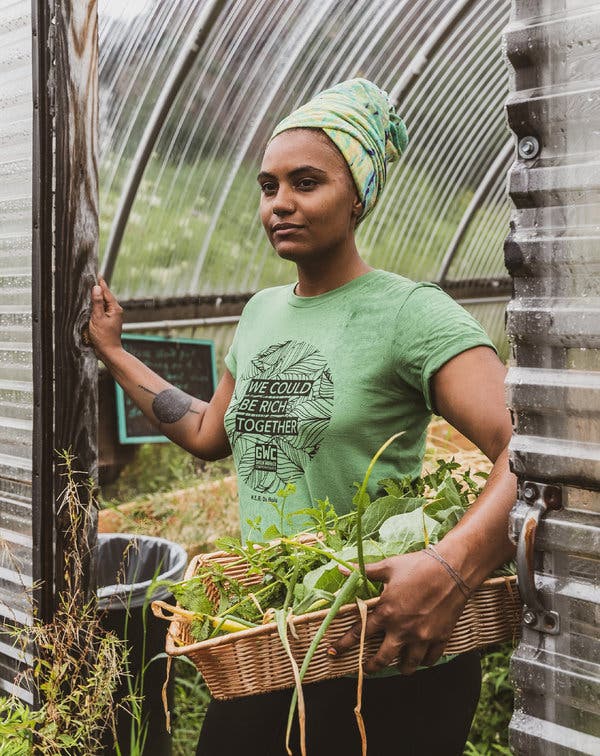
CreditJeenah Moon for The New York Times
El Espace is a column dedicated to news and culture relevant to Latinx communities. Expect politics, arts, analysis, personal essays and more. ¿Lo mejor? It’ll be in Spanish and English, so you can forward it to your tía, your primo Lalo or anyone else (read: everyone).
When my mami was growing up in Santiago in the Dominican Republic in the 1970s, her mother, a widowed seamstress, cut costs by feeding her five daughters meat only once per week. They made do with plates of rice and beans, paired with alternatives like stewed eggplant.
My Abuela Estela cut meat out of the family diet out of necessity, but today, a new generation of Dominicans in the diaspora is embracing vegan and plant-based diets with a more socially minded focus. Many are spreading their newfound knowledge through food collectives, offering meal prep services, catering and cooking classes, as well as education on the environmental and political benefits of meatless diets. Woke Foods and Next Stop Vegan, both based in New York City, as well as Coco Verde Vegan in Boston are among those leading the charge.
Ysanet Batista was inspired to start Woke Foods in 2016, after she started meal prepping for friends and family. (Two co-founders are no longer involved.) At first, she used her food stamps to buy the groceries. “I got $190 a month, and I split it. Half of it would go to buying catering ingredients, and then half of it would go to feeding myself,” she said.
She was inspired to start a catering service and completed a co-op training program that taught her the basics of business administration and co-operative history. In addition to its catering services and cooking classes, Woke Foods also has a didactic focus.
While their vegan sancocho or asopao vegetariano recipes are a hit, Batista said, “It’s also about the ways that immigration has affected our eating habits and the ways that we interact with each other around food.” She teaches Dominicans in the Bronx and Harlem about the history of Afro-Caribbean cuisine and how structural inequality manifests through the food industry.
In the Bronx, sisters Blenlly Mena and Loly Baez have transformed what was once a business operating out of Baez’s basement into a brick-and-mortar vegan meal prep service and pop-up restaurant, where they create flavorful reimaginings of Dominican and other Latin American dishes, like vegan chimis or mofonguitos. Skepticism from family members provoked concern early on that community members would question the authenticity of their creations — especially considering that, in the Dominican Republic, the signature dish of rice, beans and meat is called “la bandera,” equating it with the Dominican flag. It’s that iconic. But the local community has been nothing but receptive, they said.
Authenticity was also a concern for Cecilia Flores, who started the Boston-based catering company Coco Verde Vegan with her husband, Ivannoe Rodriguez Sierra, after their daughter was born in 2017. They wanted to introduce her to healthy, whole foods.
But she recalls a “heartbreaking moment” when she realized she might never eat a pastelito or her abuela’s pescado con coco recipe again. “Those flavors, they awaken something in you,” Flores said. “Being able to capture that in a little bit of a different way, in a way that makes you feel really good, that’s always been our aim.”
Both Flores’s and Rodriguez Sierra’s backgrounds influence their work: Rodriguez Sierra draws from his years studying at Le Cordon Bleu to craft creative recipes, while Flores’s pending doctorate in social policy informs the company’s politically conscious focus.
Flores acknowledges that a plant-based lifestyle can be out of reach for working-class communities because of food deserts, inaccessibility to resources such as farmer’s markets or basic affordability.
“Unfortunately, you cannot go with an EBT card and purchase vegan meals or vegan options at Whole Foods,” said Mena, adding that it can require research or advance planning. “It’s all about education and knowing where the resources are,” Batista added.
These organizations want to be that resource and show that plant-based diets aren’t reserved for Goop-like newsletters read by the wealthy and white. In their view, the practice is about ensuring futurity for our communities and the earth as a whole. But when it comes to her husband and herself, Flores said, “we didn’t want that to mean that we were going to lose our culture.”
Here are more stories to read this week.
El Roundup
?In an incisive op-ed for The Washington Post, Julio Ricardo Varela of Latino Rebels wrote about the controversy surrounding Puerto Rican governor Ricardo Rosselló and why protesters are demanding his resignation.
?Rita Indiana, a Dominican musician and novelist, penned a searing piece for the Boston Globe, using the attempted murder of David Ortiz and recent tourist deaths in the Dominican Republic to unpack economic inequality and corruption on the island.
?In a seemingly unending stream of heavy news from the border, I found some light in this essay about the healing powers of embroidery among Honduran women seeking asylum in Arizona.
?Doreen St. Felix is as sharp as ever, tackling the “the dull semantics of racism” surrounding President Trump’s tweets about congresswomen Alexandria Ocasio-Cortez, Ayanna Pressley, Ilhan Omar, and Rashida Tlaib.
Do you have suggestions for El Espace? Want to receive it as a newsletter? Let me know: elespace@nytimes.com







